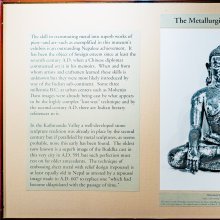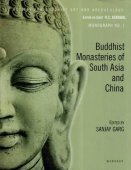Khan, Khañ: 12 definitions
Introduction:
Khan means something in Hinduism, Sanskrit, Hindi, biology. If you want to know the exact meaning, history, etymology or English translation of this term then check out the descriptions on this page. Add your comment or reference to a book if you want to contribute to this summary article.
Images (photo gallery)
In Hinduism
Vyakarana (Sanskrit grammar)
Source: Wikisource: A dictionary of Sanskrit grammarKhañ (खञ्).—tad. affix ईन (īna), applied to महाकुल (mahākula) in the sense of a descendant; e. g. माहाकुलीनः (māhākulīnaḥ) cf. P. IV. 1.141, to ग्राम (grāma) (P. IV. 2.94), to युष्मद् (yuṣmad) and अस्मद् (asmad) in the Śaiṣika senses (P.IV.3.1), to प्रतिजन, इदंयुग (pratijana, idaṃyuga) etc. (P. IV. 4.99), to माणव (māṇava) and चरक (caraka) (P. V.1.11), to ऋत्विज् (ṛtvij) (P.IV.3.71), to मास (māsa) (P. IV. 3.81), to words meaning corn in the sense of 'a field producing corn' (P.V.2.1), to सर्वचर्मन् (sarvacarman) (P.V.2.5), and to the words गोष्ठ, अश्व, शाला (goṣṭha, aśva, śālā) etc. in some specified senses (P. V. 3.18-23). A vṛddhi vowel (आ, ऐ (ā, ai) or औ) is substituted for the first vowel of the word to which this affix खञ् (khañ) is applied, as ञ् (ñ) is the mute letter applied in the affix खञ् (khañ).

Vyakarana (व्याकरण, vyākaraṇa) refers to Sanskrit grammar and represents one of the six additional sciences (vedanga) to be studied along with the Vedas. Vyakarana concerns itself with the rules of Sanskrit grammar and linguistic analysis in order to establish the correct context of words and sentences.
Biology (plants and animals)
Source: Google Books: CRC World Dictionary (Regional names)1) Khan in India is the name of a plant defined with Carissa carandas in various botanical sources. This page contains potential references in Ayurveda, modern medicine, and other folk traditions or local practices It has the synonym Damnacanthus esquirolii H. Lév. (among others).
2) Khan is also identified with Vetiveria zizanioides It has the synonym Chamaeraphis squarrosa (L.f.) Chase (etc.).
3) Khan in Sierra Leone is also identified with Zea mays It has the synonym Zea mays var. striatiamylacea Leizerson (etc.).
Example references for further research on medicinal uses or toxicity (see latin names for full list):
· Systema Naturae, ed. 12 (1767)
· FBI (1897)
· Bulletin of the Tokyo Science Museum (1947)
· Botanische Zeitung. Berlin (1851)
· Revised Handbook to the Flora of Ceylon (1931)
· Bulletin of the Torrey Botanical Club (1894)
If you are looking for specific details regarding Khan, for example side effects, pregnancy safety, health benefits, extract dosage, diet and recipes, chemical composition, have a look at these references.

This sections includes definitions from the five kingdoms of living things: Animals, Plants, Fungi, Protists and Monera. It will include both the official binomial nomenclature (scientific names usually in Latin) as well as regional spellings and variants.
Languages of India and abroad
Sanskrit dictionary
Source: DDSA: The practical Sanskrit-English dictionaryKhan (खन्).—U.
1) (khanati-te, khāta; pass. khanyate or khāyate) To dig up, delve, excavate; खनन्नाखुबिलं सिंहः (khanannākhubilaṃ siṃhaḥ) Pañcatantra (Bombay) 3.17; Ms. 2.218; Ṛtusaṃhāra 1.17.
2) To dig into the earth, bury.
Source: Cologne Digital Sanskrit Dictionaries: Shabda-Sagara Sanskrit-English DictionaryKhan (खन्).—[(u,) khanu] r. 1st cl. (khanati-te) 1. To dig or delve. 2. To hurt.
Source: Cologne Digital Sanskrit Dictionaries: Benfey Sanskrit-English DictionaryKhan (खन्).—i. 1, [Parasmaipada.], [Ātmanepada.] 1. To dig, [Mānavadharmaśāstra] 2, 218. 2. To dig up, Mahābhārata 14, 1716. 3. To pierce, [Bhartṛhari, (ed. Bohlen.)] 2, 76; [Pañcatantra] ii. [distich] 96. 4. To inter, Mahābhārata 13, 3089.
— Ptcple. of the pf. pass., khāta, n. 1. A ditch, [Hitopadeśa] iii. [distich] 57; 2. A pit, [Pañcatantra] v. [distich] 26.
Source: Cologne Digital Sanskrit Dictionaries: Cappeller Sanskrit-English DictionaryKhan (खन्).—khanati khanate [participle] khāta dig, dig up, delve, bury. [Causative] khānayati.
Source: Cologne Digital Sanskrit Dictionaries: Monier-Williams Sanskrit-English Dictionary1) Khan (खन्):—[class] 1. [Parasmaipada] khanati ([imperfect tense] akhanat; perf. cakhāna, 3. [plural] cakhnur, [Rāmāyaṇa i]; [Ātmanepada] cakhne, [Pāṇini 6-4, 98]; [present participle] [Ātmanepada] khanamāna, [Ṛg-veda i, 179, 6; Mahābhārata iii, 1897]; [imperative] khanatāt, [Aitareya-brāhmaṇa] [Pāṇini 7-1, 44; Kāśikā-vṛtti]; [Potential] khanyāt or khāyāt, [Vopadeva]; [Passive voice] khāyate [Taittirīya-saṃhitā vi; Śatapatha-brāhmaṇa iii] or khanyate, [Mahābhārata xii; Rāmāyaṇa; Pañcatantra]; [infinitive mood] khanitum, [Pañcatantra]),
—to dig, dig up, delve, turn up the soil, excavate, root up, [Ṛg-veda; Vājasaneyi-saṃhitā; Atharva-veda] etc.;
—to pierce (said of an arrow), [Bhartṛhari] ([varia lectio]) :
—[Causal] khānayati (once khan, [Rāmāyaṇa ii, 80, 12]), to cause to dig or dig up, [Śāṅkhāyana-śrauta-sūtra; Mahābhārata] etc.:—[Desiderative] cikhaniṣati, [Pāṇini 6-4, 42; Kāśikā-vṛtti] :—[Intensive] caṅkhanyate or cākhāyate, [Pāṇini 6-4, 43];—caṅkhanti or cākhāti, [Vopadeva]
2) cf. χαίνω, χανῶ, χώννυμι; Old [German] ginēm, ginōm; [modern] [German] gähne; [Anglo-Saxon] cina, cinan; [Latin] cuniculus, canalis.
Source: Cologne Digital Sanskrit Dictionaries: Yates Sanskrit-English DictionaryKhan (खन्):—(ña, u) khanati, khanate 1. c. To dig or delve; to hurt.
Source: DDSA: Paia-sadda-mahannavo; a comprehensive Prakrit Hindi dictionary (S)Khan (खन्) in the Sanskrit language is related to the Prakrit word: Khaṇa.
[Sanskrit to German]
Sanskrit, also spelled संस्कृतम् (saṃskṛtam), is an ancient language of India commonly seen as the grandmother of the Indo-European language family (even English!). Closely allied with Prakrit and Pali, Sanskrit is more exhaustive in both grammar and terms and has the most extensive collection of literature in the world, greatly surpassing its sister-languages Greek and Latin.
Hindi dictionary
Source: DDSA: A practical Hindi-English dictionary1) Khan in Hindi refers in English to:—(nf) mine; quarry; receptacle, store-house; an abridged form of [khana] used as the first member in compound words ([khana-pana])..—khan (खान) is alternatively transliterated as Khāna.
2) Khan in Hindi refers in English to:—(nm) a chieftain muslim chief; an honorific used with Afghan Muslim names; also a form of address to them..—khan (खान) is alternatively transliterated as Khāna.
...
See also (Relevant definitions)
Starts with (+744): Khaanchaa, Khaansi, Khamciya, Khamdabhamda, Khamdabhraka, Khamdacamdra, Khamdagattu, Khamdahamda, Khamdakathe, Khamdakhamdi, Khamdaladduge, Khamdamanikamcana, Khamdamegha, Khamdamgoy, Khamdamtara, Khamdamtaracalane, Khamdane, Khamdanegey, Khamdanehana, Khamdanihana.
Ends with (+31): Abhikhan, Alekhan, Anurekhan, Badrakhan, Bakhan, Bekeila-ki-dakhan, Bukhan, Dakhan, Devakhan, Dokhan, Hantekhan, Hiradakhan, Kharikhan, Kumarakhan, Kurakhan, Ladakhan, Lakhan, Latkhan, Lekhan, Makhan.
Full-text (+159): Khana, Khaṇi, Khanitra, Akha, Khans, Khanaka, Manavina, Anavina, Kha, Khaṇati, Cakhayitar, Khaṇana, Maudgina, Khanya, Nikhata, Abhikhan, Khanitri, Kheya, Akhu, Akhanika.
Relevant text
Search found 46 books and stories containing Khan, Khañ; (plurals include: Khans, Khañs). You can also click to the full overview containing English textual excerpts. Below are direct links for the most relevant articles:
The Experience of Renaissance in “Kanthapura” < [January – March, 1981]
Rose Attar < [July – September, 1987]
International Affairs: A Survey < [January 1969]
The Agni Purana (by N. Gangadharan)
The Great Buddhist Emperors of Asia (by Shibani Dutta)
Blue Annals (deb-ther sngon-po) (by George N. Roerich)
Chapter 3 - Nalanda Monastery < [Book 15 - Monastic Systems]
Chapter 1 - Shri System (ii): The Lineage of thug rje chen po < [Book 14 - Great Compassion Cycle]
Chapter 4 - Lineage of Tropuwa < [Book 14 - Great Compassion Cycle]
Lord Jhulelal: An Analytical Study (by Thakkar Harish Gopalji)
Part 7 - Specific Reference of History of Sind < [Chapter 2 - Literature Review]
Temples in and around Madurantakam (by B. Mekala)
Mugahal Rule < [Chapter 1 - Historical Backdrop]
Rule of the Nawabs of the Carnatic < [Chapter 1 - Historical Backdrop]
Maratha at Kanchipuram, 1676 < [Chapter 1 - Historical Backdrop]
Related products



